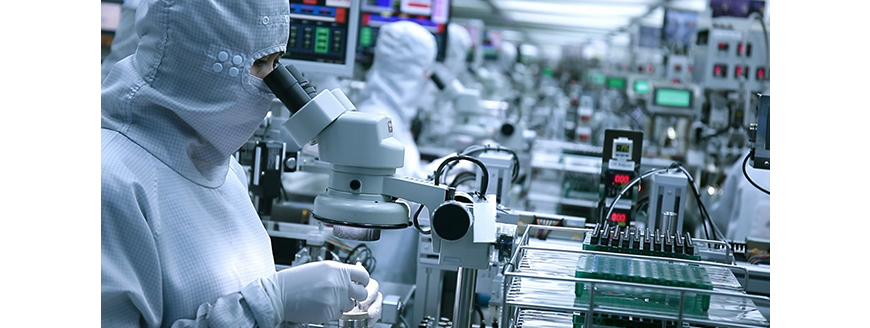NIDEC's Technical Capabilities
Submicron-Precision Machining Technology
High-Precision Machining—the Technology behind Our Number One Position in the HDD Motor Market
Motors, sensors, fans, blowers, pumps and more—the Nidec group manufactures a wide variety of products. Among these, HDD motors and related components stand out as products that have to be manufactured with especially high precision. The components used for our fluid dynamic bearings, in particular, require precision on the order of microns—or even on a submicron scale. These technically demanding products are made possible with original production and inspection equipment developed in-house over many years.
In contrast with DVD and BD related products that face no performance requirements beyond the strictly defined standards of their respective formats, products for HDDs are required to keep up with the constant evolution towards more memory capacity and higher read/write speeds. Since hard disk drives hit the market in 1956—over half a century ago—memory capacity and read/write speeds have been, and are, steadily increasing without even a moment of stagnation. Innovative magnetic encoding methods are often credited as the reason behind these advances, but in fact improvements to the mechanisms that make up the hard disk drives have contributed considerably as well. Fluid dynamic bearings are a typical example of this; as refined magnetic heads and innovative encoding methods made it possible for HDDs to record information at higher speeds with extremely high precision susceptibility to the vibration caused by the ball bearings in the spindle motors started to become a problem, setting the scene for the rise of fluid dynamic bearings.

The principle behind fluid dynamic bearings is simple: the rotating shaft is supported by dynamic oil pressure generated by herringbone-shaped grooves etched into the bearings. However, the implementation of this technique hinges on highly advanced machining technology. For example, although the diametral accuracy of our bearing shafts has a tolerance of +/- 1.5 μm, we take great care to keep all shafts within +/- 0.5 μm at our production plants. Furthermore, the gap between the shaft and the bearing has a maximum allowable deviation of 1 μm, while surface roughness has to be kept as low as 0.02 μm in extreme cases, depending on the product. Etching the herringbone-shaped grooves that generate dynamic pressure in the bearing oil also requires high-precision machining, and the electrochemical machining equipment—including the electrodes—used in this process is developed in-house.
At Nidec, these products, made with extremely high precision, are manufactured at a rate of tenths of millions of units every month, a feat that is made possible by our ultra-high-precision machining technology.

The helium-filled HDD is another recent innovation—designed in pursuit of higher performance—that makes use of Nidec's technology. As these new HDDs are hermetically sealed it is imperative to eliminate any residual non-helium gas remaining inside them. Moreover, the latest models have a less than 2 nm gap between the discs and the heads, further contributing to the need to limit any and all contamination to the extremes. In order to keep our products clean and minimize residual gas and other contamination, all components are required to go through repeated cleaning and baking procedures during every step of the manufacturing process. Non-damaging detergents that leave no residue are chosen and used in a combination with pure water. Baking temperature, heating time and the layout of the baking ovens are adjusted based on know-how that we have accumulated over many years. Our factories currently fulfill the "class 100" standard of cleanliness, but there are plans in progress to upgrade parts of the manufacturing process to the stricter "class 10" standard, bringing the requirements on both production equipment and manufacturing conditions up to the same level as that of semiconductors.


